July Newsletter
29 July 2024
And the winner is...
Aftrak has won the prestigious Milken-Motsepe Prize in Green Energy! The award was announced at the Milken Institute Global Conference in Los Angeles in May. Dr Jonathon Wilson from Loughborough University (pictured), the engineer who led the team which designed and built Aftrak, received the prize on behalf of the partnership of Loughborough University, the Consortium for Battery Innovation and Tiyeni.
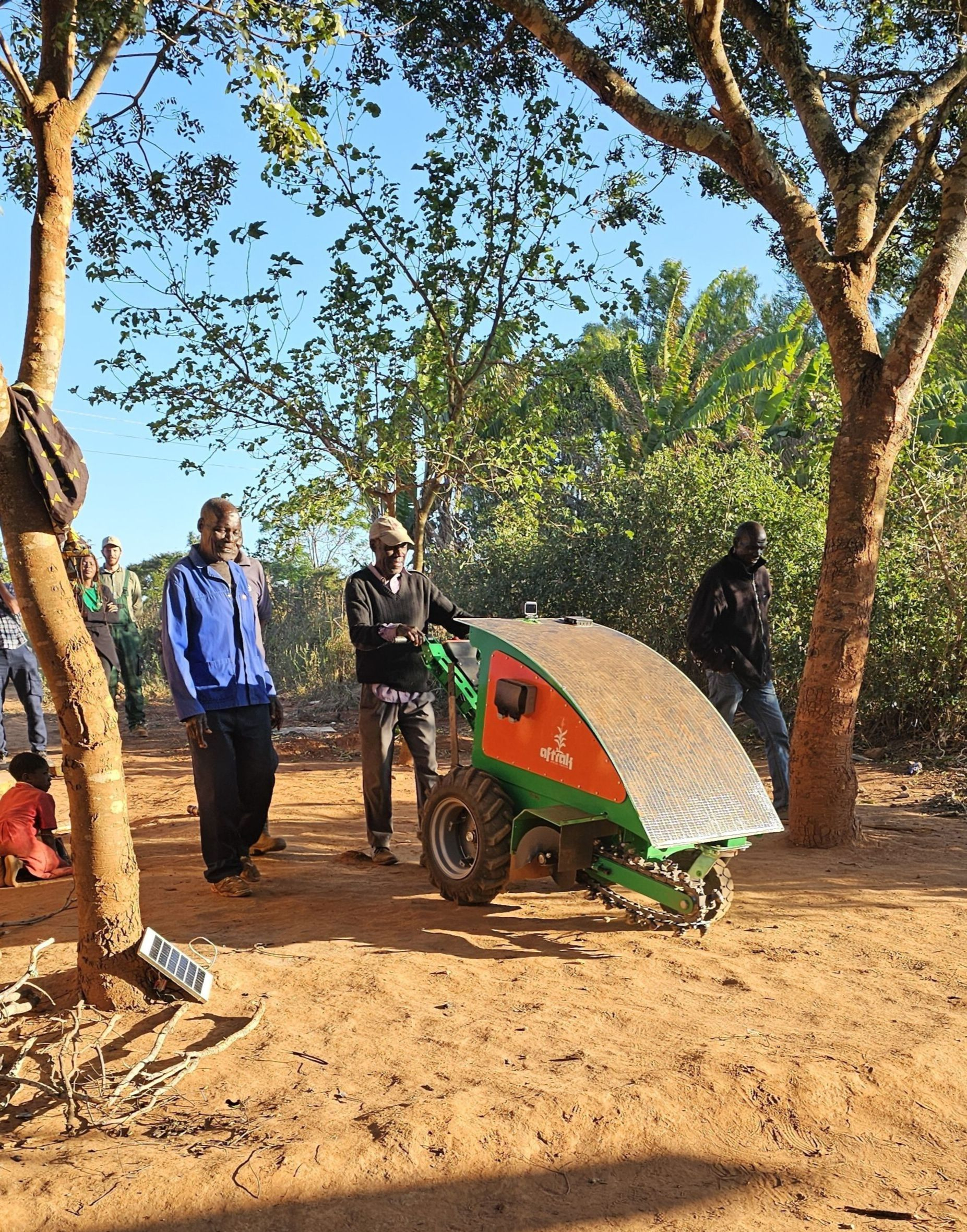
The aim of the Milken-Motsepe Prize in Green Energy is to reward innovators who expand access to reliable, affordable, and sustainable electricity in Africa. Hundreds of entrepreneurs from across the world registered to compete for the prize and 160 of those submitted technological design and business models. In June 2023, an independent panel of expert judges selected twenty semi-finalists to receive $20,000 to develop and test their innovations.
Each of the teams underwent a rigorous judging process which assessed their innovation’s potential to deliver sixty kilowatt hours of off-grid electricity in a 24-hour period using only sustainable sources. Five teams were then chosen to advance to the Finalist Round where they showcased their innovations in a live demonstration in partnership with Stellenbosch University in South Africa.
Aftrak was awarded the $1 million Grand Prize for its easily assembled solar microgrid and custom-designed tractors whose main purpose is to prepare compacted soil for Deep Bed Farming but can also provide electricity for off-grid communities.
The next phase for Aftrak is to set up a company, one that Tiyeni will be a part of. The two tractors that have been made to date are both prototypes, so much of the prize money will be spent setting up the company and on a complete redesign. This process will be informed by our team in Malawi, who have one tractor, and crucially our farmers, who have the other.
We have also installed a micro grid for our host community in Emsizini. This is powerful enough to power each house in the village. We have initially connected five houses, but they will be able to generate income through this electrification and can add more. Many were amazed and excited when we said they can plug in fridges, sewing machines, milling equipment etc. The grid is a gift from the project, and they are now responsible for the upkeep. This is minimal, with the batteries likely to run for about fifteen years before needing to be replaced. We have a local company who can provide support if needed.
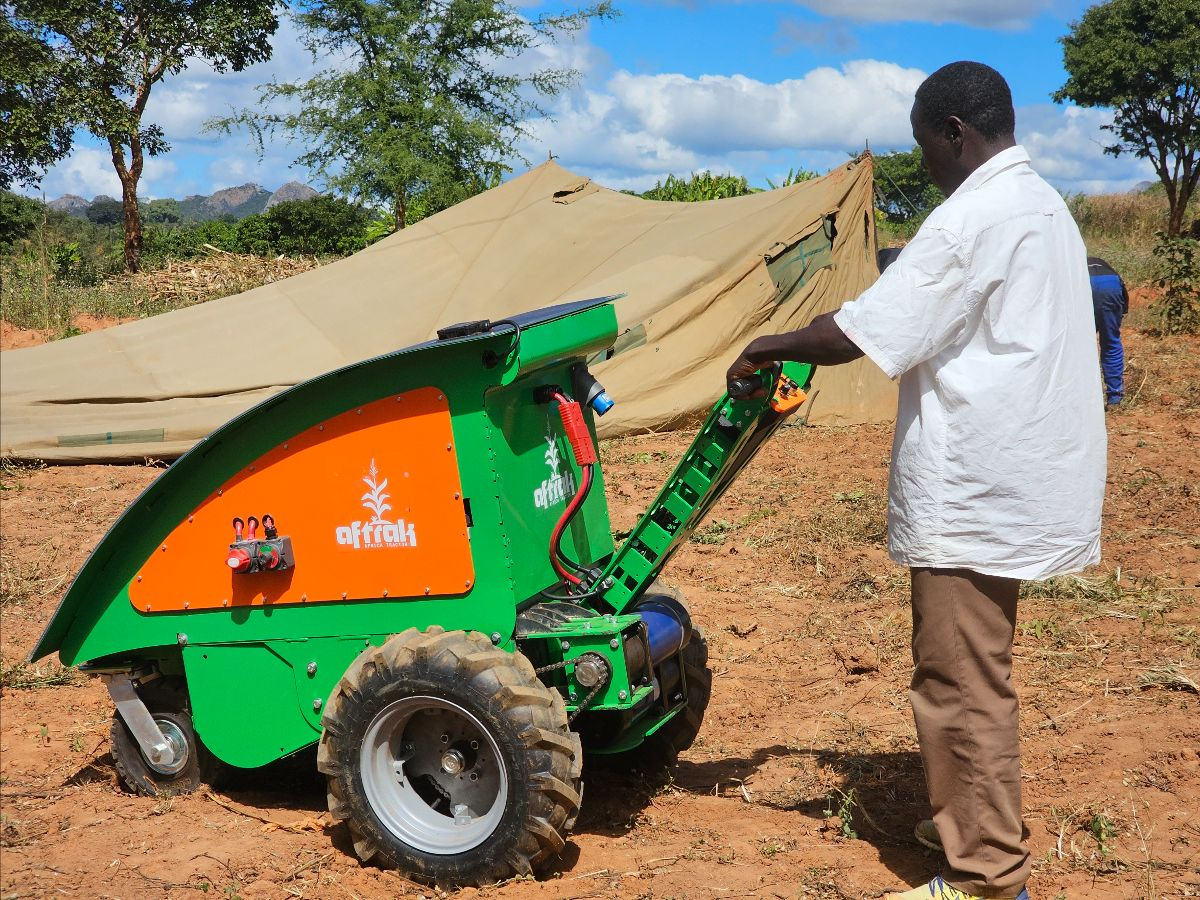
The farmers also have a tractor, and they will be testing it to prepare deep beds. This has started straight away but is impacted by seasonal rains. Our Aftrak Project Manager, Thokozani Kamphata, and our M&E Manager, France Gondwe, will be collecting feedback from our field officers and the community. Both the tractors and the solar array can also transmit data to the team. Part of the testing will be to see how long the tractor can run for on a single charge, how large an area of hardpan it can break in a day. From this vital information we can build a better tractor that meets the farmers’ needs, not a tractor we think meets their needs. Within hours of introducing Aftrak, they already had dozens of questions and suggestions.
For Tiyeni, this is an extremely exciting evolution for our small charity. As a member of the Aftrak board, we will be able to influence how the tractor is designed and how it is delivered. Our host community was gifted the prototype Aftrak system but the next phase will be about developing a business model that supports communities to invest in the system in a sustainable way.
Deep Bed Farming is a key element to this as it is proven to break the cycle of subsistence farming, empowering communities to invest in businesses and infrastructure such as electrification. Our focus has, and always will be, on empowering farmers to lift themselves out of food and water insecurity. This award has raised the profile of our work to the world stage and is allowing us to present our life-changing Deep Bed Farming method to new audiences. This will unlock new areas of support so that we can grow our team to help more communities.
Study shows how deep bed intercropping can boost maize yields and improve soil health
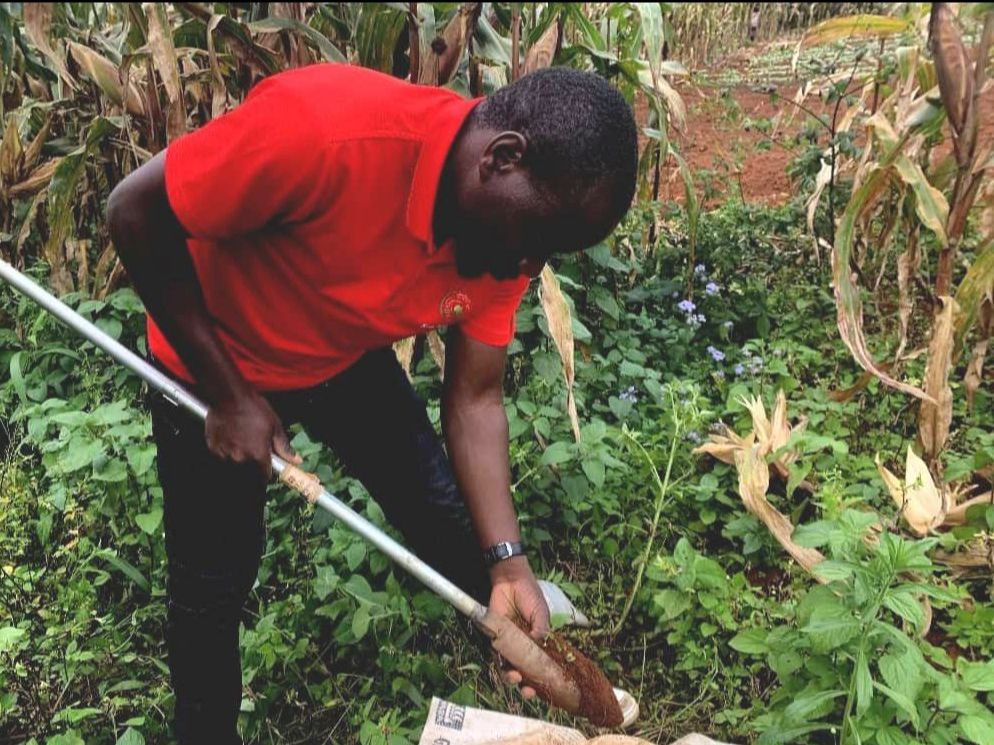
A paper has just been published in the Agrosystems, Geosciences and Environment Journal entitled ‘Comparative effects of legume-based intercropping systems involving pigeon pea and cowpea under deep bed and conventional tillage systems in Malawi'. The paper’s lead author, Augustine Phiri, told us more.
The study was conducted on the outskirts of Mzuzu city in northern Malawi. This area mainly comprises resource-poor smallholder farmers who rely on subsistence farming, which is predominantly rain-fed mono-cropping agriculture. The study aimed to investigate the effects of incorporating legume-based intercropping into Deep Bed Farming to further enhance its benefits. It included intercropping maize with cowpea, intercropping maize with pigeon pea, and growing maize alone, cowpea alone and pigeon pea alone on both Deep Bed Farming and conventional ridges.
Farmers in Malawi, like in many other parts of Africa, face significant challenges such as climate change and limited access to chemical fertilizers. Climate change is making weather patterns unpredictable, and the soil is losing nutrients due to erosion and struggling to retain moisture, which makes it difficult to grow enough food. This problem is worsened by continuous mono-cropping of cereals such as maize, which depletes soil nutrients without farmers having enough fertilizer to replenish the soil.
Cereal-legume intercropping could be a game-changer. Intercropping means growing two or more crops together on the same piece of land. Legumes can fix nitrogen from the atmosphere into the soil, making it more fertile. This natural fertilization process helps improve soil health and supports better growth for other crops, like maize, that are planted alongside legumes.
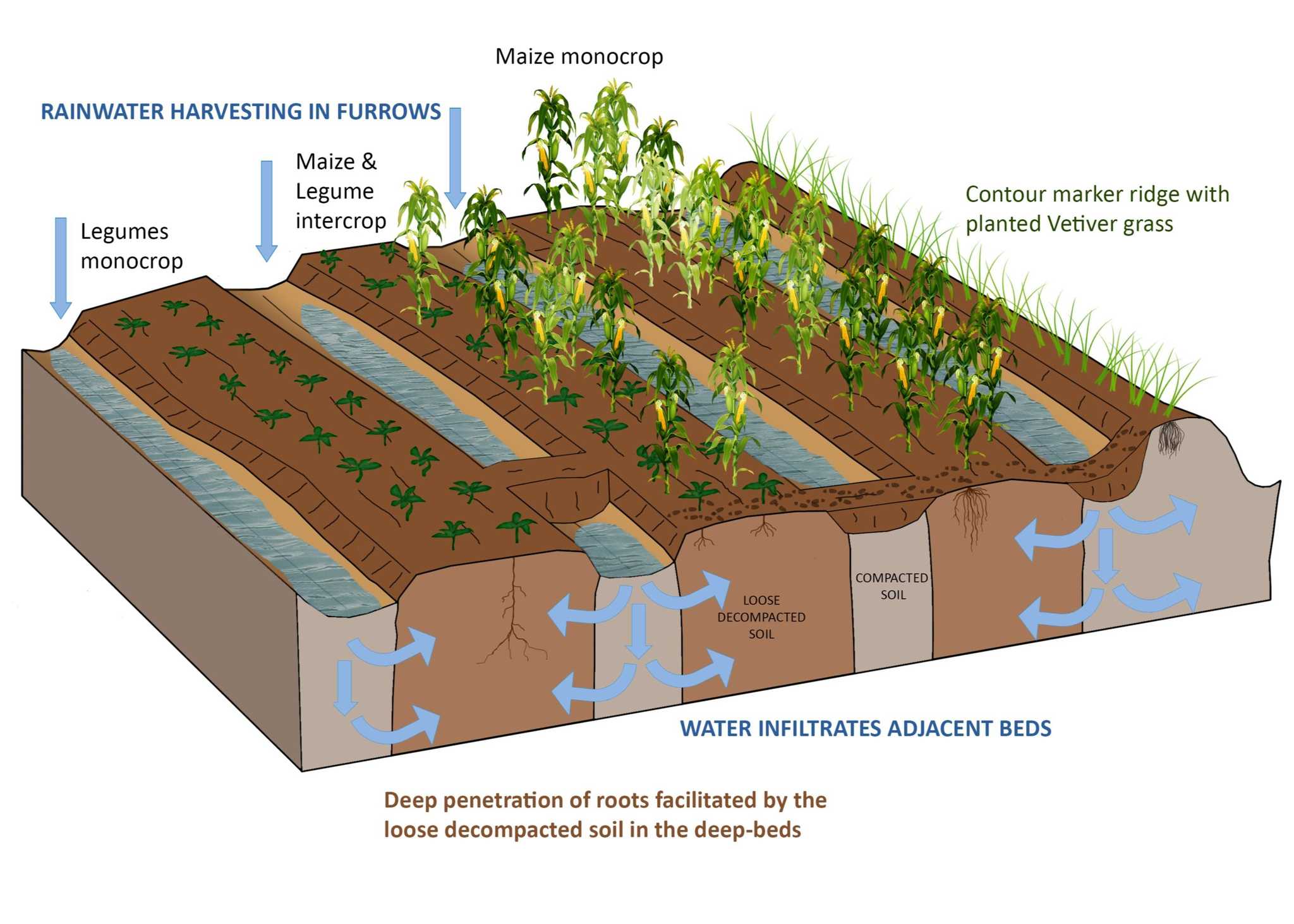
The study was conducted over two consecutive growing seasons to see how intercropping and Deep Bed Farming work over a longer period of time. This approach was used to check whether the positive effects observed in the first season would continue into the next. This method reflected the common practice among smallholder farmers in the region, who often repeat their planting patterns year after year.
After conducting the study over two rainy growing seasons (2020/21 and 2021/22), two key findings emerged:
- Improved soil fertility: Intercropping maize with legumes significantly increased nutrient content such as available nitrate, ammonium, and available phosphorus. The nitrogen-fixing ability of pigeon pea and cowpea enriched the soil, reducing the need for external fertilizers. These effects were significantly higher on Deep Bed Farming compared to ridges over two growing seasons.
- Enhanced grain yields: Crops grown in legume-based intercropping systems showed higher yields compared to mono-cropped systems. The complementary relationship between legumes and the maize crop improved overall productivity. These effects were significantly higher on Deep Bed Farming compared to ridges over two growing seasons.
These findings provide valuable insights into how combining Deep Bed Farming with legume intercropping can significantly improve crop yields and soil health. There are several reasons why this is important:
- Sustainable agriculture: By improving soil fertility naturally, farmers can reduce their dependence on chemical fertilizers, which are often expensive and difficult to access. This makes farming more sustainable and cost-effective.
- Food security: Higher yields mean more food can be produced on the same amount of land. This is crucial for smallholder farmers who rely on their harvests to feed their families and communities.
- Economic benefits: Implementing a system that combines Deep Bed Farming with legume-based intercropping not only enhances crop yields and soil health but also translates into tangible economic advantages. Firstly, by reducing the reliance on chemical fertilizers, farmers can lower input costs, thus improving their profit margins. Moreover, increased yields mean more produce to sell, potentially leading to higher incomes for farmers.
- Environmental benefits: Deep Bed Farming reduces soil erosion and helps retain soil moisture, which is important in regions prone to drought. The natural nitrogen-fixing process of legumes also reduces the environmental impact of farming.
The success of this study suggests that expanding the use of Deep Bed Farming combined with legume intercropping could help address some of the biggest challenges faced by farmers in Malawi. By adopting these practices, farmers can improve their soil health, increase their crop yields, and make their farming practices more sustainable.
As climate change continues to impact agriculture worldwide, innovative approaches like these will be essential for ensuring food security and supporting the livelihoods of smallholder farmers. The results from this study provide a promising model that could be replicated in other regions facing similar challenges.
In short, combining cereal-legume intercropping with Deep Bed Farming holds great potential for improving farming in Malawi. By harnessing the natural benefits of legumes and the structural advantages of Deep Bed Farming, farmers can create a more resilient and productive agricultural system. This innovative approach not only boosts yields but also enhances soil health, offering a sustainable path forward for smallholder farmers in Malawi and beyond.
You can read the full paper here.
Meet France Gondwe, Tiyeni’s Monitoring and Evaluation Manager
France has been working with smallholder farmers, focusing on land conservation technologies, food security and sustainable livelihoods, for more than twenty years. He has been working with Tiyeni since 2017, using his research and analysis to demonstrate the benefits of Deep Bed Farming. We caught up with him to find out more.

What first attracted you to come and work at Tiyeni?
When I was working with Target Consulting Limited, Tiyeni's Country Director invited me to the Maturi Field Day. I immediately saw that Tiyeni’s Deep Bed Farming was a technology that would be of great benefit to Malawi. Malawi’s agricultural sector had been stuck in a low productivity rut regardless of the long-standing support for agricultural capacity building and research; I therefore immediately committed myself to help Tiyeni to bring the Deep Bed Farming technology to a wider audience.
How does your strong academic background support your day-to-day work?
My role as the M&E Manager requires me to be on top the current conceptualisations and those of the near future. I need to be able to collect and analyse data and draw conclusions that can be reported as advantages and opportunities or weaknesses or threats of Deep Bed Farming. My background helps me to interpret project targets and develop indicators and milestones for assessing project progress and achievements. It also helps me to develop measurement tools that can align our assessments with conventional ones. For example, use of the food insecurity measure developed by the FAO called the Food Insecurity Experience Scale requires a strong academic background. I have a pending PhD (I’m seeking thesis funding) and an MSc in Agriculture Economics. With this background I have assisted Tiyeni and Ministry of Agriculture staff at all levels to appreciate Deep Bed Farming as a technology with very high environmental benefits compared with the current technologies for land management that lack take-up by farmers.
What's the most satisfying part of your job?
The most satisfying part of my job is sharing the statistics which demonstrate the versatility of Deep Bed Farming to farmers and agricultural experts. The statistics draw a lot of attention from the interested parties, especially farmers due to the yield and income potential so that they commit to use Deep Bed Farming at scale. The statistics show that committed farmers experience a life-changing turn-around in the first year of cultivation.
Secondly is the change in perception of the agriculture experts in Malawi towards Deep Bed Farming from an inferior technology. During the recent National Field Days, extension officers commented that “it is the most important technology for input reduction… and for increasing smallholder farmers' yields”. There is now an overwhelming demand for Deep Bed Farming from prospective partners and collaborators.
I am very happy to be one of the pioneers of this revolution which has seen multiple yield increases for farmers and total land degradation control in Malawi. Malawi’s smallholder agriculture production is limited by agronomic challenges despite the many seed varieties that the Department of Agriculture Research Services releases every year in a bid to improve yield; and Deep Bed Farming addresses the problem of low yield levels with high levels of increases, up to four times more than the national average. Secondly, farmers are able to institute land degradation control with Deep Bed Farming and the associated soil and water conservation measures such as box ridges, swales, check dams, agroforestry.
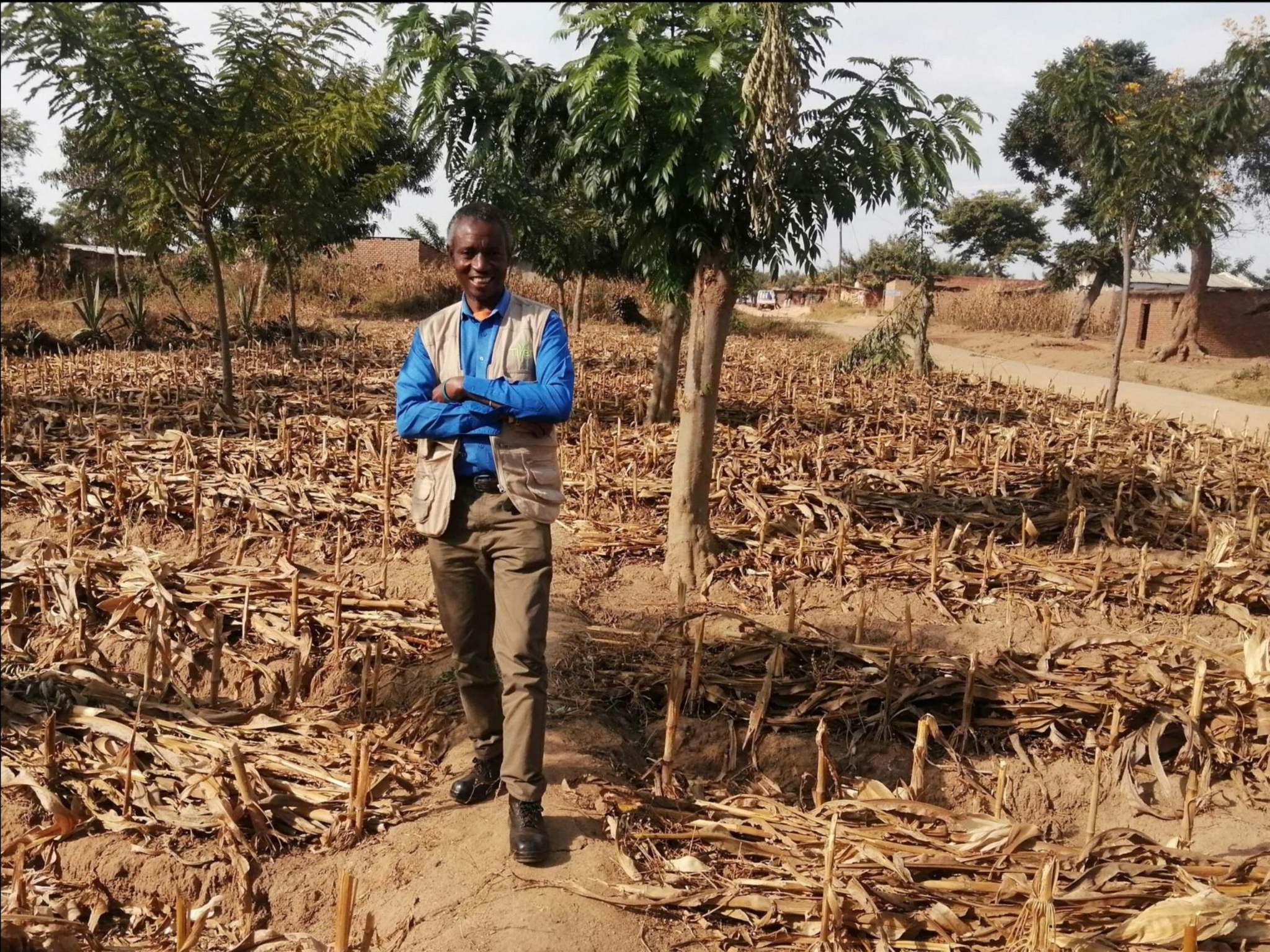
You've been with Tiyeni for a few years now. You must have seen some changes in that time?
Between 2017 and 2021, Deep Bed Farming had mixed responses from government extension where district supervising staff reprimanded junior field staff for trying to show them very good crops from an ungazetted technology. So when Deep Bed Farming became an official recommended technology in 2021, it was an important change in the status of Deep Bed Farming and Tiyeni. This has seen Tiyeni increasingly conducting activities through government extension.
Deep Bed Farming is becoming a research topic with recent research interest from Kyoto University in Japan; Loughborough University and Worcester University in the UK; and universities in Malawi including LUANAR, LINIA and Mzuzu University.
There is increased acceptance that runoff /erosion control and catchment management in Malawi is possible through promotion of Deep Bed Farming and associated technologies.
What do you like to do outside work?
I am a church minister with responsibility as a Deputy International Coordinator for Sunday School at the Enlightened Christian Gathering - The Jesus Nation Church. I also like gardening with a mix of vegetables, arable crops and trees as well as jogging and athletics.
